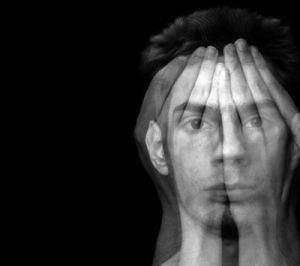 Derealization, also called allopsychic depersonalization, is a pathological condition in which psychosensory perception of the reality of the surrounding world is disturbed.
Derealization, also called allopsychic depersonalization, is a pathological condition in which psychosensory perception of the reality of the surrounding world is disturbed.
In this disorder, a person distorts the surrounding reality, it may seem remote, unreal, discolored. Reality is perceived as illusory. Familiar surroundings, objects, phenomena are felt alien, unnatural, mutated. Or, on the contrary, the individual observes deja vu( dejavu - already seen).
The person creates sensations similar to a dream, with being inside a computer game, the world seems unreal.
Derealization is a neurotic disorder. Often, while the patient retains full control over their actions, demonstrates adequate behavior and is completely sane. The individual is aware of the illogicality and unreality of his state. The syndrome of derealization can manifest itself briefly and for a long time, can occur sporadically, and can be repeated frequently.
The connection of the derealization and depersonalization of
Derealization often arises together with the self-perception disorder of the personality - depersonalization. With depersonalization, the individual perceives his body and his own actions, as an outside observer, who has no control.
The International Classification of Diseases does not separate these two states and refers to them as the "Depersonalization-Derealization Syndrome"( F 48.1).Often, the term "derealization" refers to a group of disorders with similar symptoms that are expressed in a distorted perception of the surrounding reality.
Complex of provocative causes
Derealization is considered a fairly common disorder, it is observed in more than 4% of people, and the number of patients all the time  is growing. It often acts as a protective mechanism of a person in stressful situations, with various shocks, experiences. Most often this perceptual disorder occurs in individuals of both sexes under the age of 25 years, that is, in the period of formation and self-determination.
is growing. It often acts as a protective mechanism of a person in stressful situations, with various shocks, experiences. Most often this perceptual disorder occurs in individuals of both sexes under the age of 25 years, that is, in the period of formation and self-determination.
The disorder is most often observed in extroverts, which are overly impressionable and emotional. The risk of occurrence of attacks of a frustration at individuals inclined to perfectionism is high, and having the overestimated level of claims.
Among the main causes of the development of derealization are called:
- Biochemical causes of .In the patient's body, an insufficient amount of dopamine, serotonin, norepinephrine, which regulate the work of the psychoemotional sphere, is responsible for a sense of pleasure, a positive attitude. Also, the cause may be a lack of gamma-aminobutyric acid, a reduced function of the neural opiate system. Heredity. Propensity to pathological anxiety can be genetically incorporated, and be a kind of "family" way of responding to stressful situations.
- Personal-psychological causes of .The development of the disorder can result in the presence of such individual traits of a person as impressionability, suspiciousness, increased demands on oneself, vulnerability, perfectionism, pedantry, a tendency to be fixed in negative situations.
- Somatic causes of .The development of derealization can be triggered by the presence of the following diseases in an individual: hypoglycemia( low blood glucose level);some diseases of internal organs;pathological processes in internal organs;hyperthyroidism( excessive thyroid function);diseases of the respiratory system;pheochromocytoma( a hormone-active tumor, most often located in the adrenal medulla);prolapse of the mitral valve.
- Social causes of .The disorder can develop as a result of an unfavorable family situation, child psychological trauma, conflict situation in the educational or work collective, death of relatives, the presence of a prolonged or incurable disease, divorce, and lack of emotional support.
- Dependencies of .The risk factors for the development of the syndrome are narcotic, alcohol dependence, smoking, use of psychoactive substances.
- The lack of a healthy lifestyle .Lack of sleep, poor quality sleep, lack of proper rest, improper functioning, mental and physical overload are also a favorable environment for the development of the disorder.
Symptoms and clinic of derealization
 With the derealization of patients, it appears that reality, objects, society are not natural, fantastic, alien, and the patient can not find an explanation for how this happened.
With the derealization of patients, it appears that reality, objects, society are not natural, fantastic, alien, and the patient can not find an explanation for how this happened.
Reality is perceived as through a dream, as if through glass, opaque film, fog. The surroundings can be perceived as scenery. Everything around seems to be lacking in volume, indistinct, dull, without perspective.
In case of seizures, the perception of time is distorted. Some patients have a feeling that the processes around have slowed down, stopped. In other patients, on the contrary, there is a feeling of acceleration of time processes, the swiftness of events. In rare cases, the perception of the past, present and future disappears, and everything is perceived as present.
The most common symptoms of derealization are visual disturbances. The environment can be perceived as one-colored, gray, fuzzy. All around can resemble a drawing in pencil.
In rare cases, the reverse may happen - everything around seems very bright, similar to cartoons. Visual distortions also appear in "tunnel" vision, when everything except the object of focusing merges. Also, the world around can be perceived as inverted by 180 °, or as a mirror image.
Auditory disorders are expressed in the perception of other people's speech as a slowed, acute perception of individual sounds, ringing in the ears. Sounds can be perceived as distant.
With allopsychic depersonalization, there are violations of tactile perception: the patient can not determine the physical parameters of the object( temperature, material, texture) by touch.
Distortion of the perception of space is expressed in the fact that an individual can not estimate the distance: the distant seems close, the near - the distant one.
Diagnosis and test for
disorder Differential diagnosis is necessary to diagnose. This is necessary in order to exclude the presence of more serious psychopathological syndromes. For this, psychotherapists use a survey on the scale of Nuller and Genkina.
Such a derealization test can be done online and it helps to identify the severity of the disorder, determine whether the patient is aware of the pathological nature of his perception of  , is able to give a critical assessment of his feelings. During the test, the patient is asked questions related to the symptoms, and the patient should indicate the degree and frequency of their manifestation. The test results of 30-31 points indicate the presence of the patient's syndrome.
, is able to give a critical assessment of his feelings. During the test, the patient is asked questions related to the symptoms, and the patient should indicate the degree and frequency of their manifestation. The test results of 30-31 points indicate the presence of the patient's syndrome.
In addition, the doctor needs to examine the patient, checking his reflexes, skin condition and so on, to check for vegetative disorders, to study the patient's and his family's medical history, to appoint a test( urine and blood tests, electrocardiogram, electroencephalography, magnetic resonance imaging).It is also necessary to conduct a test for sensory sensitivity, which includes testing of tactile sensations, reaction to light, visual and auditory perception.
The diagnosis of derealization is made if the patient can critically assess his condition;realizes that distortion of the surrounding world occurs only in his perception;is in clear consciousness.
How to get rid of the obsessive state of
The treatment for derealization does not require a hospital stay. The first stage of treatment eliminates symptoms, usually with the help of drug therapy.
For the blocking of panic attacks, the method of displacement of emotions is used, the essence of which is to switch attention to pleasant things for the patient during an attack( favorite music, food).Regular application of this method brings a cumulative effect, and due to the developed reflex, the frequency and duration of attacks decreases.
Medication therapy involves taking medications that relieve anxiety and panic attacks:
- tranquilizers( benzodiazepine series) - Phenazepam;
- tricyclic antidepressants - Clomipramine;
- Neuroleptics - Quetiapine.
 Patients are also recommended taking potassium, magnesium, B vitamins, as well as multivitamins.
Patients are also recommended taking potassium, magnesium, B vitamins, as well as multivitamins.
In case the patient has a tendency to depressive states, it is recommended to prescribe a therapeutic diet, gymnastics and group therapy sessions. If the syndrome arose against the background of an already existing depressive disorder, then drug therapy with antidepressants of selective serotonin reuptake inhibitors( SSRIs) - Fluoxetine, anticonvulsants - Lamotrigine is prescribed.
At the second stage, attention is focused on the reasons for the occurrence of derealization. Psychotherapeutic sessions help in this. They are aimed at identifying and eliminating the causes that have influenced the patient's condition. Cognitive-behavioral techniques, methods of auto-suggestion are considered effective. Art therapy is also recommended.
Prevention of derealization should be aimed at eliminating stressful situations from life, which provoke frustration.
It is necessary to pay attention to the mode of work and rest, to put in order the quantity and quality of sleep. To warn the appearance of the syndrome  it is possible, abandoning the addictions. It is recommended to pay attention to the state of health: to lead an active lifestyle, get a full rest, eat fully, exercise, have daily physical activity. To reduce the amount of stress recommended contrast shower, breathing exercises, aromatherapy.
it is possible, abandoning the addictions. It is recommended to pay attention to the state of health: to lead an active lifestyle, get a full rest, eat fully, exercise, have daily physical activity. To reduce the amount of stress recommended contrast shower, breathing exercises, aromatherapy.
Derealization attacks not only worsen the quality of life, but can be dangerous, because they can happen at the wheel of a car, on the street, in a situation where a person's life depends on his concentration on events.
If you do not start therapy for this disorder, the consequences can be quite severe. Attacks can lead to changes in the psyche, and to the development of serious pathologies of the central nervous system.



